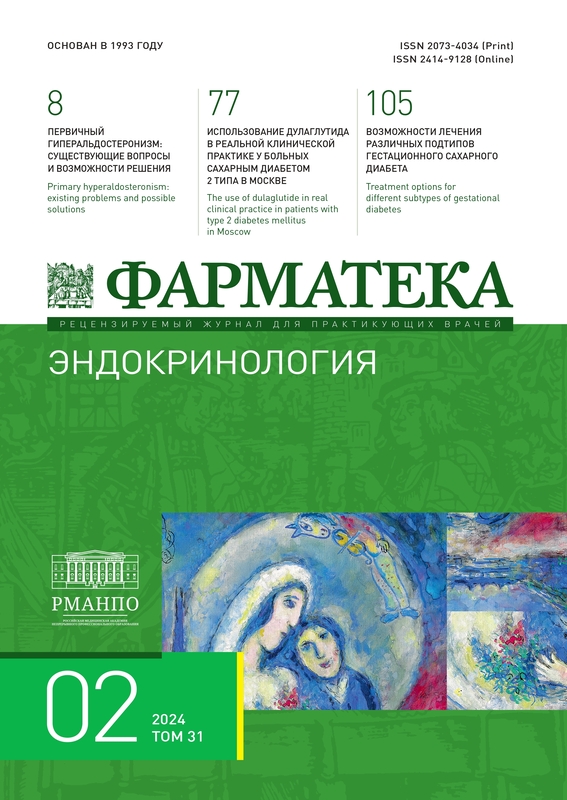Comparative characteristics of the incidence of various endocrinopathies in cancer patients receiving treatment with immune checkpoint inhibitors
- Autores: Zhurtova I.B.1, Aramisova L.S.1, Abdul Moati H.A.1, Arkhestova D.R.1, Khachmakhova E.Z.1
-
Afiliações:
- Department of Faculty Therapy, Medical Academy, Kabardino-Balkarian State University n.a. Kh.M. Berbekov
- Edição: Volume 31, Nº 2 (2024)
- Páginas: 50-54
- Seção: Clinical experience
- URL: https://journals.eco-vector.com/2073-4034/article/view/632321
- DOI: https://doi.org/10.18565/pharmateca.2024.2.50-54
- ID: 632321
Citar
Texto integral
Resumo
To date, there are at least 6 national and international guidelines for the management of endocrine complications associated with the use of immune checkpoint inhibitors (ICPIs). This article is a summary of the latest guidelines developed by a number of scientists on behalf of the European Society of Endocrinology (ESE). The article presents possible endocrine complications during therapy with anti-CTLA-4, anti-PD-1, anti-PD-L1 drugs and combination treatment with ipilimumab and nivolumab. Combination treatment with ICPIs with chemotherapy or targeted therapy is not discussed in the guidelines and article.
Texto integral
Sobre autores
I. Zhurtova
Department of Faculty Therapy, Medical Academy, Kabardino-Balkarian State University n.a. Kh.M. Berbekov
Autor responsável pela correspondência
Email: zhin07@mail.ru
ORCID ID: 0000-0003-0668-1073
Dr. Sci. (Med.), Professor at the Department of Faculty Therapy
Rússia, NalchikL. Aramisova
Department of Faculty Therapy, Medical Academy, Kabardino-Balkarian State University n.a. Kh.M. Berbekov
Email: zhin07@mail.ru
ORCID ID: 0000-0001-8105-4235
Rússia, Nalchik
H. Abdul Moati
Department of Faculty Therapy, Medical Academy, Kabardino-Balkarian State University n.a. Kh.M. Berbekov
Email: zhin07@mail.ru
ORCID ID: 0009-0009-4374-8442
Rússia, Nalchik
D. Arkhestova
Department of Faculty Therapy, Medical Academy, Kabardino-Balkarian State University n.a. Kh.M. Berbekov
Email: zhin07@mail.ru
ORCID ID: 0000-0002-5490-4166
Rússia, Nalchik
E. Khachmakhova
Department of Faculty Therapy, Medical Academy, Kabardino-Balkarian State University n.a. Kh.M. Berbekov
Email: zhin07@mail.ru
ORCID ID: 0009-0006-6537-3969
Rússia, Nalchik
Bibliografia
- Husebye E.S., et al. Endocrine-related adverse conditions in patients receiving immune checkpoint inhibition: an ESE clinical Practice Guideline. Eu. J Endocrinol. 2022;187(6):G1–21. Doi: 10.1530/ EJE-22-0689.
- Журтова И.Б., Эльгарова Л.В., Губачикова А.М. Иммунноопосредованные нежелательные эндокринные явления при лечении ингибиторами контрольных точек иммунного ответа: клинический опыт ниволумаб-индуцированного тиреоидита. Фарматека. 2022;7:90–4. хZhurtova I.B., Elgarova L.V., Gubachikova A.M. Immune-mediated endocrine adverse events during treatment with immune checkpoint inhibitors: a clinical case of nivolumab-induced thyroiditis Farmateka. 2022;7:90–4. (In Russ.)]. doi: 10.18565/pharmateca.2022.7.90-94.
- Martins F., Sofiya L., Sykiotis G.P., et al. Adverse effects of immune-checkpoint inhibitors: epidemiology, management and surveillance. Nature Reviews: Clin Oncol. 2019;16:563–80. doi: 10.1038/s41571-019-0218-0.
- Brahmer J.R., Lacchetti C., Schneider B.J., et al. Management of immune-related adverse events in patients treated with immune checkpoint inhibitor therapy: American Society of Clinical Oncology clinical practice guideline. JClin. Oncol. 2018;36:1714–68. Doi: 10.1200/ JCO.2017.77.6385.
- Castinetti F., Albarel F., Archambeaud F., et al. French Endocrine Society Guidance on endocrine side effects of immunotherapy. Endocrin Relat Cancer 2019;26:G1–18. doi: 10.1530/ERC-18- 0320.
- Paschou S.A., Stefanaki K., Psaltopoulou T., et al. How we treat endocrine complications of immune checkpoint inhibitors. ESMO Open. 2021;6:100011. doi: 10.1016/j.esmoop.2020.100011.
- Wright J.J., Powers A.C., Johnson D.B. Endocrine toxicities of immune checkpoint inhibitors. NatRev. Endocrinol. 2021;17:389–99. doi: 10.1038/s41574-021-00484-3.
- Di Dalmazi G., Ippolito S., Lupi I., Caturegli P. Hypophysitis induced by immune checkpoint inhibitors: a 10-year assessment. Exp Rev Endocrinol Metab. 2019;14:381–98. Doi: 10.1 080/17446651.2019.1701434.
- Bai X., Chen X., Wu X., et al. Immune checkpoint inhibitor-associated pituitary adverse events: an observational, retrospective, disproportionality study. J Endocrinol Invest. 2020;43:1473–83. doi: 10.1007/s40618-020-01226-4.
- Albarel F., Gaudy C., Castinetti F., et al. Long-term follow-up of ipilimumab-induced hypophysitis, a common adverse event of the anti-CTLA-4 antibody in melanoma. Eur J Endocrinol. 2015;172:195–204. Doi: 10.1530/ EJE-14-0845.
- Min L., Hodi F.S., Giobbie-Hurder A., et al. Systemic high-dose corticosteroid treatment does not improve the outcome of ipilimumab-related hypophysitis: a retrospective cohort study. Clin Cancer Res. 2015;21:749–55. doi: 10.1158/1078-0432.CCR-14-2353.
- Langlois F., Varlamov E.V., Fleseriu M. Hypophysitis, the growing spectrum of a rare pituitary disease. JClin. Endocrinol Metab. 2022;107:10–28. doi: 10.1210/clinem/dgab672.
- Tan M.H., Iyengar R., Mizokami-Stout K., et al. Spectrum of immune checkpoint inhibitors-induced endocrinopathies in cancer patients: a scoping review of case reports. Clin Diab Endocrinol. 2019;5:1. doi: 10.1186/s40842-018-0073-4.
- Faje A.T., Lawrence D., Flaherty K., et al. High-dose glucocorticoids for the treatment of ipilimumab-induced hypophysitis is associated with reduced survival in patients with melanoma. Cancer. 2018;124:3706–14. doi: 10.1002/cncr.31629.
- Stelmachowska-Banas M., Czajka-Oraniec I. Management of endocrine immune-related adverse events of immune checkpoint inhibitors: an updated review. Endocrin Connect. 2020;9:R207–28. doi: 10.1530/EC-20-0342.
- Iyer P.C., Cabanillas M.E., Waguespack S.G., et al. Immune-related thyroiditis with immune checkpoint inhibitors. Thyroid. 2018;28:1243–51. doi: 10.1089/thy.2018.0116.
- Stott D.J., Rodondi N., Kearney P.M., et al. Thyroid hormone therapy for older adults with subclinical hypothyroidism. N Engl J Med. 2017;376:2534–44. https://doi. org/10.1056/NEJMoa1603825
- de Filette J., Andreescu C.E., Cools F., et al. A systematic review and meta-analysis of endocrine-related adverse events associated with immune checkpoint inhibitors. Horm Metab Res. 2019;51:145–56. doi: 10.1055/a-0843-3366.
- Wright J.J., Salem J.E., Johnson D.B., et al. Increased reporting of immune checkpoint inhibitor-associated diabetes. Diab Care. 2018;41:e150–1. doi: 10.2337/dc18-1465.
- Goldenberg R.M., Berard L.D., Cheng A.Y.Y., et al. SGLT2 inhibitor-associated diabetic ketoacidosis: clinical review and recommendations for prevention and diagnosis. Clin Ther. 2016;38:2654.e1–64. doi: 10.1016/j.clinthera.2016.11.002.
- Tran T.T.T., Pease A., Wood A..J., et al. Review of evidence for adult diabetic ketoacidosis management protocols. Front Endocrinol. 2017;8:106. Doi: /10.3389/fendo.2017.00106.
- Cardona Z., Sosman J.A., Chandra S., Huang W. Endocrine side effects of immune checkpoint inhibitors. Front Endocrinol (Lausanne). 2023;14:1157805. doi: 10.3389/fendo.2023.1157805.
- Trevisani V., Iughetti L., Lucaccioni L., Predieri B. Endocrine immune-related adverse effects of immune-checkpoint inhibitors. Exp Rev Endocrinol Metab. 2023;18(5):441–51. doi: 10.1080/17446651.2023.2256841.
Arquivos suplementares








